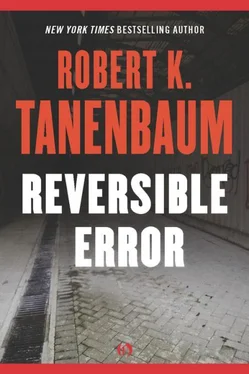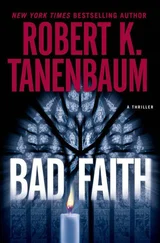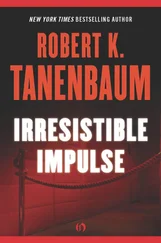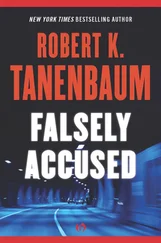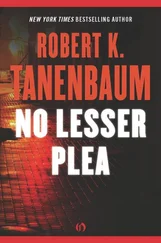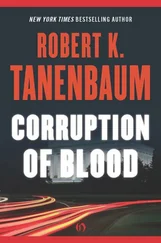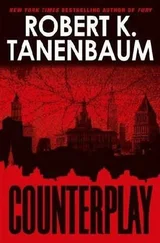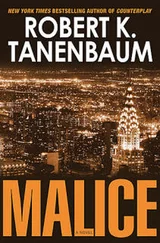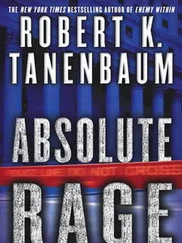Robert Tanenbaum - Reversible Error
Здесь есть возможность читать онлайн «Robert Tanenbaum - Reversible Error» весь текст электронной книги совершенно бесплатно (целиком полную версию без сокращений). В некоторых случаях можно слушать аудио, скачать через торрент в формате fb2 и присутствует краткое содержание. Жанр: Криминальный детектив, на английском языке. Описание произведения, (предисловие) а так же отзывы посетителей доступны на портале библиотеки ЛибКат.
- Название:Reversible Error
- Автор:
- Жанр:
- Год:неизвестен
- ISBN:нет данных
- Рейтинг книги:5 / 5. Голосов: 1
-
Избранное:Добавить в избранное
- Отзывы:
-
Ваша оценка:
- 100
- 1
- 2
- 3
- 4
- 5
Reversible Error: краткое содержание, описание и аннотация
Предлагаем к чтению аннотацию, описание, краткое содержание или предисловие (зависит от того, что написал сам автор книги «Reversible Error»). Если вы не нашли необходимую информацию о книге — напишите в комментариях, мы постараемся отыскать её.
Reversible Error — читать онлайн бесплатно полную книгу (весь текст) целиком
Ниже представлен текст книги, разбитый по страницам. Система сохранения места последней прочитанной страницы, позволяет с удобством читать онлайн бесплатно книгу «Reversible Error», без необходимости каждый раз заново искать на чём Вы остановились. Поставьте закладку, и сможете в любой момент перейти на страницу, на которой закончили чтение.
Интервал:
Закладка:
After a few minutes Karp said in a dull voice, "I guess you're starting to close things down, right? Since you're leaving and all."
"Right," said Marlene, intending no such thing.
Silence reigned for the rest of the ride. Karp slouched in the corner of his seat, exhausted, the despair growing in him. He'd burned his bridges with Denton, that was for sure, however this mess turned out. He was surprised at how acutely he felt the loss. Perhaps he had imagined the extent of feeling in the relationship. What was he to Denton after all? A chip on the table? A useful tool?
Faces flashed before his mind's eye as he subjected various relationships to the skills honed at a thousand Q amp;A's. Garrahy, a man absolutely himself, a model. How did you get that way? Where did the sureness come from? Denton. In the Garrahy mold, but… maybe it was that Karp was older, more experienced. Maybe he would have seen the same duplicity of motive in Garrahy if… No, that was crazy. Garrahy was all right. Denton was OK too. Fulton. Impossible to believe he was corrupt. There must be some mistake about shooting Booth. Maybe. Maybe nothing was as it seemed. The image of the lawyer Rich Reedy floated into his mind. A rogue, maybe, but an honest rogue. No pretenses. Maybe that was the way to survive. No illusions, no hypocrisy.
Karp felt again a familiar painful emptiness. He defined it to himself as missing Garrahy and the ability to speak his mind frankly to a man he respected, but at some level he understood that it was more than that, something injured and missing behind the deepest defense. Now, and unusually, he thought of his father. He would have to do something about his family. He was getting married, after all.
He imagined visiting his father, and his father's hot young wife, and telling them. His father would take him aside. "They got any money?" he would ask confidentially, meaning Marlene's family, feeling for the business possibilities. No? Then he would grin conspiratorially and say, "She's a good piece of ass, huh?" Money and sex, the twin poles of existence. He might also say, "Schmuck! Rich girls got pussy too," one of his favorite expressions.
Dan, the younger of Karp's two older brothers, would say the same thing, probably in the very same words. He had abraded his own personality into a pathetic clone of the old man's, in a suicidal search for a morsel of attention. Richard, the eldest, had gone off the other end, seeking purity in a return to the faith. Assuming that Rabbi Richie could even bring himself to see Butch the Apostate, Karp imagined himself sitting in his brother's musty living room, in which even the thick air had been passed as strictly kosher, and telling him that he was-the final infamy-marrying a shiksa. They would hear the blast in Tel Aviv.
So much for family. Karp shook his head, as if clearing it after a physical blow. Why did he have to be alone like this? He was going to be a father soon, for God's sake! What the hell did he know about being a father? What could he teach the kid? Shooting hoops? Cross-examination? He was the one who needed a father.
But this thought, which might have occasioned much profitable internal dialogue, and also explained a good deal about Karp's career thus far, was cut short by the arrival of the taxicab at its destination, a large apartment house on Central Park West.
"That's four-eighty," said the cab driver.
"Ground control to Butch," said Marlene. "We're here."
Karp snapped to, fumbled for his wallet, paid, and left the cab. Marlene looked up at him, a worried expression on her face, and squeezed his arm. "Where were you?"
Karp shrugged. He really didn't know. "Just tired, I guess. Let's go up."
TEN
The woman who opened the door was half Karp's size, and to Marlene's eye Sophie Leo-noff bore scant resemblance to her grandnephew. Karp immediately swept her up into a hug that raised her shiny little shoes several inches off the ground. She kissed him loudly on both cheeks.
"Uhh! What a monster!" she cried. "My ribs are broken. Come in, come in!"
She ushered them out of the dim hallway and into a large brightly lit living room. Karp made the introductions, and Marlene could now examine her hostess more clearly. The face bore the deep lines and pouches of seventy or more years, but the huge black eyes that shone from their deep nets of wrinkles seemed younger, humorous and sharp. She was heavily but carefully made up. Her hair was dyed dark red, and she wore it in a tight nest of permed curls.
On her thin frame she wore a marvelous dress of black silk, netted across the front and decorated with sequins, the kind they sell in the little appointment-only dress shops that dot the Fifties off Fifth Avenue.
Aunt Sophie also wore a simple string of pearls and a clinking assortment of bracelets and jeweled rings. A rich New York matron in a remarkable state of preservation, thought Marlene, and was preparing herself to undergo an evening in her patented nice-to-old-ladies persona, when she became aware of being subjected to a scrutiny sharper than the one she herself had applied.
Aunt Sophie had cocked her head back and was examining Marlene through shrewd and narrowed eyes, a quizzical smile playing on her lips. She fondled the material of Marlene's suit jacket briefly, felt the lining, then made a little turning motion of her hand, jangling her bracelets. "Turn around for me, dolling," she said.
Marlene rotated obediently. "A nice five," said Aunt Sophie. "Very nice. So tell me, when you're expecting?"
Marlene blushed and uttered an astounded laugh. Aunt Sophie patted her arm reassuringly. "Dolling, pardon me I'm calling a cat a cat. I was in the business. I made more wedding gowns than I got hairs left. You ain't the first, believe me."
Marlene looked at Karp, who was standing like a phone booth, examining the ceiling. "December," she said.
"That's nice," said Aunt Sophie. "I'll be a great-great-aunt, I should live that long." She clutched Karp by the elbow. "You, momser, come with me to the kitchen, you can help take out from the oven. I don't like to bend down so much, I maybe can't stand up straight again." To Marlene she said, "Make yourself comfortable, dolling. There's a bar there, have what you want. You could make me a little Scotch and soda with ice, denk-you."
The tiny woman hauled Karp away and Marlene walked over to the bar, taking in the living room as she did so. It was furnished in the taste of the late thirties, art-deco-painted furniture in beige and pale gray, bas-relief plaques featuring sharp-eyed women with their wooden hair carved in buns, a white baby-grand piano covered with photographs in silver and wooden frames.
The thick carpeting was beige, as were the walls, which held two large lithographs, framed and signed, one by Ben Shahn and the other by Picasso. Everything shiny and well-cared-for, without mustiness or fuss, as in the kind of museums where people actually live in costume among colonial antiques.
The bar was also a reminder of an age when the upper middle classes poured enormous quantities of hard liquor down their throats at every occasion in which more than two people were in a room for more than three minutes. Marlene made a Scotch for Sophie and a Coke for Karp. She restricted herself to a white wine, in deference to the Little Embarrassment.
Sipping her wine, she inspected the pictures on the piano, at first idly, then with fascination, as she realized they cast a hitherto unavailable light on the mysterious stranger to whom she had bound herself. Here were Aunt Sophie and another woman, in their twenties. Sophie, lovely as a young bluebird, was laughing, while her companion, less well-favored but still handsome, looked out at the camera suspiciously with a face full of unerring righteousness: Karp's ferocious late grandmother.
Читать дальшеИнтервал:
Закладка:
Похожие книги на «Reversible Error»
Представляем Вашему вниманию похожие книги на «Reversible Error» списком для выбора. Мы отобрали схожую по названию и смыслу литературу в надежде предоставить читателям больше вариантов отыскать новые, интересные, ещё непрочитанные произведения.
Обсуждение, отзывы о книге «Reversible Error» и просто собственные мнения читателей. Оставьте ваши комментарии, напишите, что Вы думаете о произведении, его смысле или главных героях. Укажите что конкретно понравилось, а что нет, и почему Вы так считаете.
